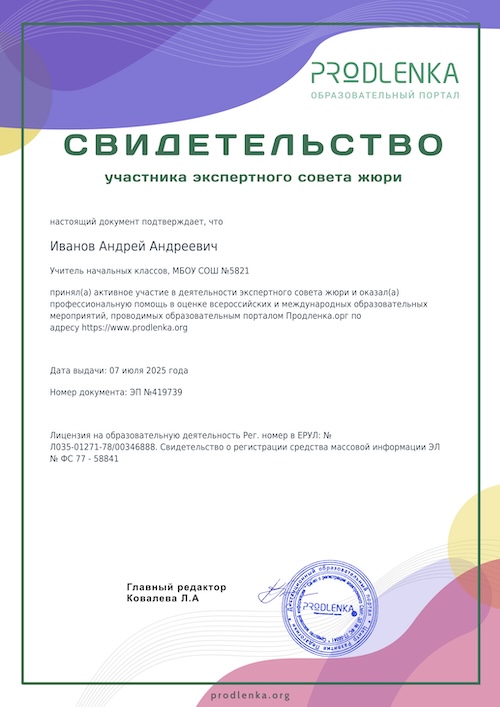Свидетельство о регистрации
СМИ: ЭЛ № ФС 77-58841
от 28.07.2014
Преимущества публикации работ учащихся
- Мотивация и развитие – ученики видят ценность своего труда, учатся ясно выражать мысли, а педагоги демонстрируют эффективность своих методов.
- Репутация и карьера – публикации укрепляют портфолио учащихся и повышают престиж учебного заведения.
- Обратная связь и рост – учителя и ученики получают внешнюю оценку, что стимулирует дальнейшее развитие.
Свидетельство автора
Диплом руководителя
Дождитесь публикации материала, после чего оформите свидетельство автора о публикации в СМИ и диплом для
руководителя.
Повышение квалификации
- Курс-практикум «Педагогический драйв: от выгорания к горению»
- «Труд (технология): специфика предмета в условиях реализации ФГОС НОО»
- «ФАООП УО, ФАОП НОО и ФАОП ООО для обучающихся с ОВЗ: специфика организации образовательного процесса по ФГОС»
- «Специфика работы с детьми-мигрантами дошкольного возраста»
- «Учебный курс «Вероятность и статистика»: содержание и специфика преподавания в условиях реализации ФГОС ООО и ФГОС СОО»
- «Центр «Точка роста»: создание современного образовательного пространства в общеобразовательной организации»
Проект
Most people would agree that the beginning of the 21st century is characterized by the increasing integrity of all economic, political, social and cultural processes in the world. Thus, knowledge of foreign languages has become of paramount importance for everyday life, we can no longer afford to remain monolingual.
The English language is widely spread in our country. A good knowledge of the language is impossible without knowledge of its idioms. The world of Russian and English idioms is large and diverse. Is there anything in common in idioms of these two languages or there are some differences?
Have you ever thought how learning idioms in English helps you meet today’s challenges? What idioms are the most important and useful nowadays? Thus, the goal of our research is to study the similarity and differences between the most common and frequent idioms in the English and Russian languages.
As the subject of our research, we studied the similarities and differences between idioms in the English and Russian languages.
We have chosen idioms of these two languages, as the object of our research.
The practical significance is the fact that this work can be used as a self-help guide to the English and Russian idioms for studying.
An idiom is a phrase or an expression that has a figurative, or sometimes literal meaning. We can find idioms in every language. In Russia and the UK we face idioms in the informal language and sometimes in literature. Idioms make the language picturesque and give the unique national flavor that distinguishes one language from another. They enrich speech due to their ability to express accurately and figuratively the essence of rather complex phenomena. For example, Break a leg, used as an ironic way of wishing good luck in a performance or presentation, may have arisen from the belief that one ought not to utter the words "good luck" to an actor. By wishing someone bad luck, it is supposed that the opposite will occur.
We can find some English idioms which are similar to Russian idioms. For instance:
Сжигать мосты – to burn bridges;
Нет дыма без огня – there is no smoke without fire;
Искать иголку в стоге сена – look for a needle in a bottom of hay;
Another kind of similar idioms are idioms which came from literature because all over the world people read works of famous authors such as Andersen and Shakespeare.
Examples:
A skeleton in the closet – скелет в шкафу
The emperor has no clothes – а король - то голый.
An ugly duckling – гадкий утенок.
Other similarity is that most often in the formation of idioms are used the names of the parts of the body.
Examples:
To wash one’s head – намылить шею
Acid look – кислое лицо
Armed to the teeth – вооруженный до зубов
We compared idioms in the English and Russian languages and discovered their similarity in structure, imagery and stylistic colouring:
Играть с огнем – to play with fire;
жить как кошка с собакой – a cat and dog life
игра стоит свеч – the game is worth the candle
Some of these idioms are international, and they claim to be native to different languages, i.e. in each language they are considered to be their own.
The following expressions are very similar in Russian and English:
глаза – зеркало души – the eyes are the mirror of the soul;
It is interesting to note that many Russian and English expressions go back to one source – the Bible. The Bible is the richest source of phraseological units. This greatest work enriched both Russian and English with similar units. Here are just some of them:
The beam in one’s eye – бревно в собственном глазу.
Daily bread – хлеб насущный.
A storm in a tea-cup – Буря в стакане воды.
Animals that symbolize human qualities in Russian and English have much in common, but there are differences. The similarity is explained by common sources – the Bible, and differences are explained by the peculiarities of life of each nation. The comparison of the Russian and English idioms you can see by the example of the description of human qualities in the table
I have conducted a poll among the pupils of the 10-th form to see how popular idioms are nowadays. I have asked them the following questions:
1) Is it useful to know idioms?
2) Do you use them in your everyday speech?
3) Do you know English equivalents of famous Russian idioms?
4) Would you like to learn more about English and Russian idioms?
The results were predictable. You can see the results on the screen. For the last question, all the students gave positive answers. Thus, we can make a conclusion that the subject of our work is important. It is obviously that nowadays students use idioms and find them a good way of expressing their feelings and emotions. Despite their interest in learning idioms of the English and Russian languages, they do not know how to use them in the right way. That is why, we have collected the most commonly used idioms in a list, which contains idioms and their meaning (Appendix 3). Have a look at it. Learning English idiomatic expressions from this list can help everyone speak English better.
Thus, we have found out that with the help of phraseological expressions the understanding of the language is enhanced. In our work we have revealed how diverse and expressive the phraseological units of modern English and Russian languages are, how similar and different they are.
The last but not the least thing we have done in our work is a list of the most commonly used idioms in the English language and their meaning in the Russian language. We are sure it will help those who studies English to know it better.
The English language is widely spread in our country. A good knowledge of the language is impossible without knowledge of its idioms. The world of Russian and English idioms is large and diverse. Is there anything in common in idioms of these two languages or there are some differences?
Have you ever thought how learning idioms in English helps you meet today’s challenges? What idioms are the most important and useful nowadays? Thus, the goal of our research is to study the similarity and differences between the most common and frequent idioms in the English and Russian languages.
As the subject of our research, we studied the similarities and differences between idioms in the English and Russian languages.
We have chosen idioms of these two languages, as the object of our research.
The practical significance is the fact that this work can be used as a self-help guide to the English and Russian idioms for studying.
An idiom is a phrase or an expression that has a figurative, or sometimes literal meaning. We can find idioms in every language. In Russia and the UK we face idioms in the informal language and sometimes in literature. Idioms make the language picturesque and give the unique national flavor that distinguishes one language from another. They enrich speech due to their ability to express accurately and figuratively the essence of rather complex phenomena. For example, Break a leg, used as an ironic way of wishing good luck in a performance or presentation, may have arisen from the belief that one ought not to utter the words "good luck" to an actor. By wishing someone bad luck, it is supposed that the opposite will occur.
We can find some English idioms which are similar to Russian idioms. For instance:
Сжигать мосты – to burn bridges;
Нет дыма без огня – there is no smoke without fire;
Искать иголку в стоге сена – look for a needle in a bottom of hay;
Another kind of similar idioms are idioms which came from literature because all over the world people read works of famous authors such as Andersen and Shakespeare.
Examples:
A skeleton in the closet – скелет в шкафу
The emperor has no clothes – а король - то голый.
An ugly duckling – гадкий утенок.
Other similarity is that most often in the formation of idioms are used the names of the parts of the body.
Examples:
To wash one’s head – намылить шею
Acid look – кислое лицо
Armed to the teeth – вооруженный до зубов
We compared idioms in the English and Russian languages and discovered their similarity in structure, imagery and stylistic colouring:
Играть с огнем – to play with fire;
жить как кошка с собакой – a cat and dog life
игра стоит свеч – the game is worth the candle
Some of these idioms are international, and they claim to be native to different languages, i.e. in each language they are considered to be their own.
The following expressions are very similar in Russian and English:
глаза – зеркало души – the eyes are the mirror of the soul;
It is interesting to note that many Russian and English expressions go back to one source – the Bible. The Bible is the richest source of phraseological units. This greatest work enriched both Russian and English with similar units. Here are just some of them:
The beam in one’s eye – бревно в собственном глазу.
Daily bread – хлеб насущный.
A storm in a tea-cup – Буря в стакане воды.
Animals that symbolize human qualities in Russian and English have much in common, but there are differences. The similarity is explained by common sources – the Bible, and differences are explained by the peculiarities of life of each nation. The comparison of the Russian and English idioms you can see by the example of the description of human qualities in the table
I have conducted a poll among the pupils of the 10-th form to see how popular idioms are nowadays. I have asked them the following questions:
1) Is it useful to know idioms?
2) Do you use them in your everyday speech?
3) Do you know English equivalents of famous Russian idioms?
4) Would you like to learn more about English and Russian idioms?
The results were predictable. You can see the results on the screen. For the last question, all the students gave positive answers. Thus, we can make a conclusion that the subject of our work is important. It is obviously that nowadays students use idioms and find them a good way of expressing their feelings and emotions. Despite their interest in learning idioms of the English and Russian languages, they do not know how to use them in the right way. That is why, we have collected the most commonly used idioms in a list, which contains idioms and their meaning (Appendix 3). Have a look at it. Learning English idiomatic expressions from this list can help everyone speak English better.
Thus, we have found out that with the help of phraseological expressions the understanding of the language is enhanced. In our work we have revealed how diverse and expressive the phraseological units of modern English and Russian languages are, how similar and different they are.
The last but not the least thing we have done in our work is a list of the most commonly used idioms in the English language and their meaning in the Russian language. We are sure it will help those who studies English to know it better.
Содержимое разработки

Конкурсы для педагогов и воспитателей
Официальные Всероссийские и Международные дистанционные конкурсы. Мероприятия разработаны с учетом рекомендаций Минобрнауки РФ для учащихся и педагогов.
Принять участие
Конкурсы для школьников и дошкольников
Всероссийские конкурсы для дошкольников и школьников (1–11 классы) проводятся по разным направлениям и номинациям. Участвуйте, раскрывайте таланты и достигайте успехов!
Принять участие









































Чтобы оставлять комментарии, вам необходимо авторизоваться на сайте. Если у вас еще нет учетной записи на нашем сайте, предлагаем зарегистрироваться. Это займет не более 5 минут.